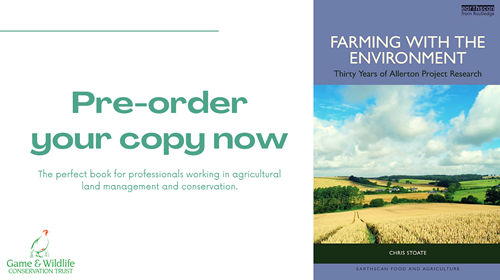In recent blogs we have sought to provide some alterative viewpoints on the conservation versus food production conundrum (see Sugar beet and neonics, Landscape recovery, True cost of a meal deal). One of the underlying themes to these commentaries was that reduced management or intervention is not the answer; the answer is a balance, often referred to as sustainable production.
So the recent press release by the Science for Sustainable Agriculture (SSA) on the need for a better conversation around science in our farming systems is very much in tune with this message. It appears however that we need to be better in getting this message across; many respondents to the SSA’s market research felt that information could be presented in more consumer-friendly terms.
Providing the balance between maintaining domestic food and supporting farmland biodiversity will require specific management approaches – and it is best if these are led by science. It is therefore encouraging that the SSA consumer research found that there is “….a willingness among consumers to recognise and accept the contribution of scientific intervention in tackling these challenges and in supporting more sustainable approaches to food production.”
Dr Alastair Leake, who heads up the Trust’s Allerton Project, sits on the Advisory Group at the SSA as Allerton embraces much of the SSA’s philosophy about promoting sustainable food production rooted in scientific evidence.
The Trust recently submitted evidence to the House of Lord’s Land Use in England Committee where we put forward the experience of the Allerton Project as an example of how each farm could consist of a mosaic of food, carbon, biodiversity, water and wild areas. We emphasised that, importantly, each of these objectives is researched and the outcomes used to design management approaches to optimise outcomes.
For example, the farm has introduced short-term legume rich leys to the already diverse rotation of wheat, oats, barley, oil seed rape and beans to improve soil structure and health and to reduce use of inorganic nitrogen and plant protection products and when the leys flower, they provide food for insect pollinators.
An agro-forestry experiment is underway looking at optimal planting densities for carbon sequestration (soil, trees and fuel), soil biology, habitat and sporting value, improved water infiltration (reduced downstream flooding), grazing value and improved livestock welfare (shade in summer, shelter in winter) whilst maintaining meat and wool production, very much bringing to life the concept of multi-functional land use, where benefits are “stacked” on the same piece of land.
The other key element is the need for an adaptive approach. As our scientific understanding improves, policy needs to adjust. The Allerton project provides a good example here too. The research results inform the decision making on the farm and given our commercial approach enable us to identify some of the challenges from changing farming systems; such as increased herbicide costs, and compaction in the early stages of conversion to a no-till system. These challenges have guided both our continuing research, and our management of the farm.
In addition, the approach to wildlife ‘farming’ has evolved in response to our research and the need to deliver for both biodiversity and economic outcomes. Initially crops were dispersed across the farm to create a mosaic of habitats, including strips of set-aside run up through the middle of large fields.
But yield mapping combine harvesters now tell us this is the most productive area for growing food, whilst the ecologists now tell us that birds prefer to feed in the field margins, close to the safety of the hedgerow. We have also sought other ways to support biodiversity in the non-cropped areas through creative management resulting in the formulation of a number of agri-environment scheme options such as beetle banks and riparian buffer strips.
As the quote of the week on the SSA website says “"Scientific beliefs are supported by evidence, and they get results. Myths and faiths are not and do not.”[1]
[1] Richard Dawkins Evolutionary biologist

NEW BOOK - Farming with the Environment: Thirty Years of Allerton Project Research
This brand new book examines, discusses and shares over 30 years’ worth of research from the Allerton Project, a research and demonstration farm in the UK which has been carrying out research to explore and explain the need to adapt the management of farmland for environmental protection and to provide public benefits. Find out more and order your copy here.
PRE-ORDER HERE →